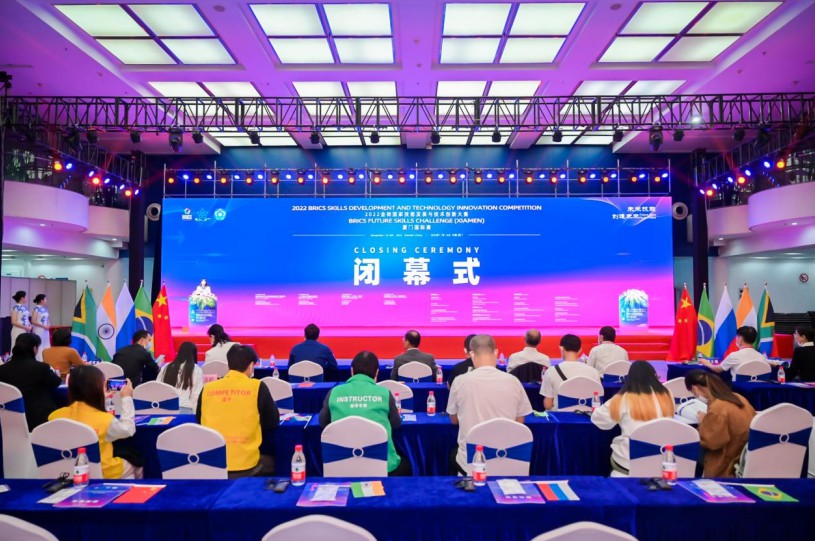
On the afternoon of November 6, the closing ceremony of 2022 BRICS Skills Development and Technology Innovation Competition BRICS Future Skills Change (Xiamen) was successfully held.

Yu Huarong, Secretary of the Party Committee, Executive Vice President and Secretary General of China Invention Association, Liu Zhenying, Chairman of the Skills Development Working Group of the BRICS Business Council, Chairman of the Belt and Road & BRICS International Alliance for Skills Development, Director of the Belt and Road & BRICS Training Center for Skills Development and Technological Innovation of China Association for Science and Technology, Chairman of the Executive Committee of the Organizing Committee of the BRICS Skills Development and Technological Innovation Competition, and President of the Xiamen BRICS Institute for Skills Development and Technological Innovation for the Future, were present in the Closing Ceremony.
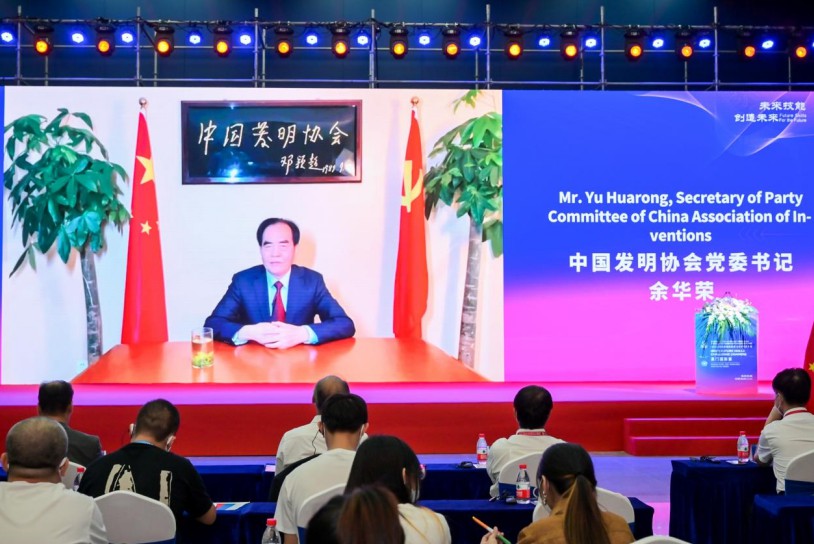
Yu Huarong said in his closing speech that since 2017, the China Invention Association has cooperated with the BRICS Business Council and actively participated in co-organizing the co-hosting of the Belt and Road and BRICS Skills Development and Technological Innovation Competition, and will continue to make positive contributions to the cultivation of internationalized, high-tech and skilled talents and humanistic exchanges for BRICS countries in the future.
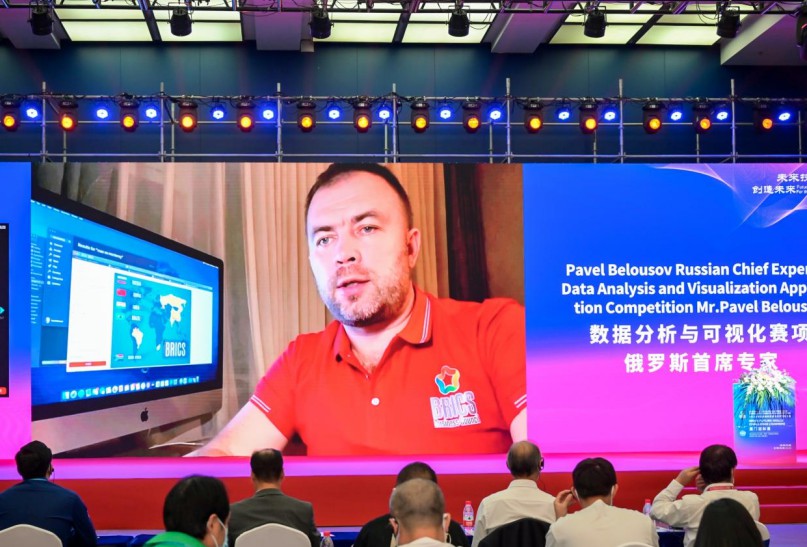
The Xiamen International Tournament received a total of 201 teams from home and abroad to register for the competition, including 457 players from 145 domestic colleges and institutions, as well as 26 international players from Russia and South Africa. The tournament adopted a remote distributed competition mode, i.e., domestic teams competed centrally at the offline venue of Xiamen International Convention and Exhibition Center, while other BRIC countries set up remote venues locally and competed synchronously with the Xiamen venue through the digital information platform of the competition. The teams from each country delivered a good report card, and 12 teams and 8 individual players stood out and won the first prize of the group and individual, among which, Russia and South Africa each had one participant who won the first prize.
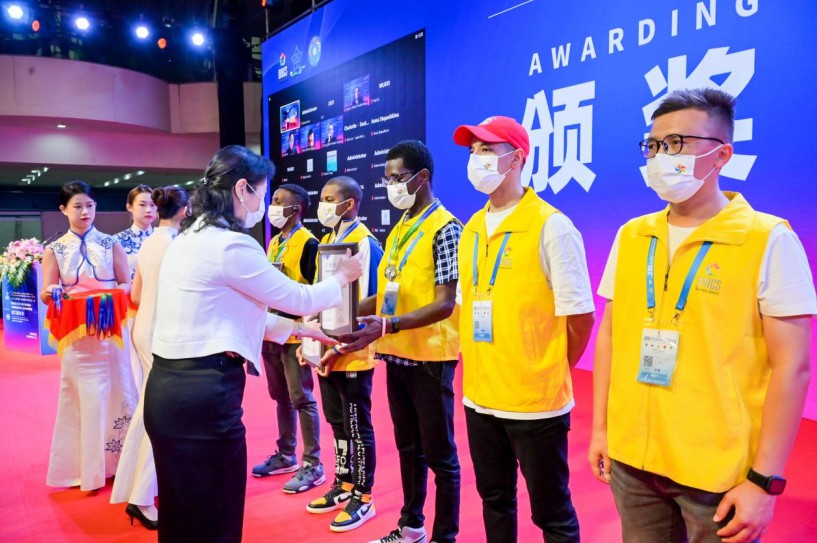
The list of winners is as follows: the first prize winners of the IoT technology and its application in smart city competition are Guizhou Equipment Manufacturing Vocational College and Wuchang Vocational College; the first prize winners of the AI engineering technology application competition are Wuchang Vocational College and Chengdu Vocational College of Technology; the domestic first prize winners of the Financial Robotics (RPA) Skills Competition are Nantong Institute of Industry and Trade Technician and Hubei Ecological Engineering Vocational and Technical College. The foreign first prize winner is Ms. Nonhlanhla Mndebele from South Africa; the first prize winners of the 5G+MR Resource Development Competition are Shenzhen Vocational and Technical College and Heyuan Vocational and Technical College; the first prize winner of the Smart Agriculture Environment Monitoring Competition is Yangling Vocational and Technical College; the first prize winner of the Data Analysis and Visualization Competition domestic team is Chongqing Institute of Business and Technology, Wuhan Institute of Vocational Technology, and the foreign team is St. Petersburg State University of Aerospace Instrumentation, Russia; Young Creators is divided into two tracks, Industrial Innovation and Future Technology, the first prize winner of the Industrial Innovation track is Hunan University of Engineering, Nanchang University of Aviation; the first prize winner of the Future Technology track is Guangxi Institute of Water Conservancy and Electricity Power Vocational and Technical College, Yanshan University; Cardiac Rehabilitation is divided into the Individual Competition and the Team Competition. The first prize winners of individual competition are Changchun Hospital of Traditional Chinese Medicine University and Ningbo Huamei Hospital of University of Chinese Academy of Sciences, and the first prize winners of team competition are Changchun Hospital of Traditional Chinese Medicine University.
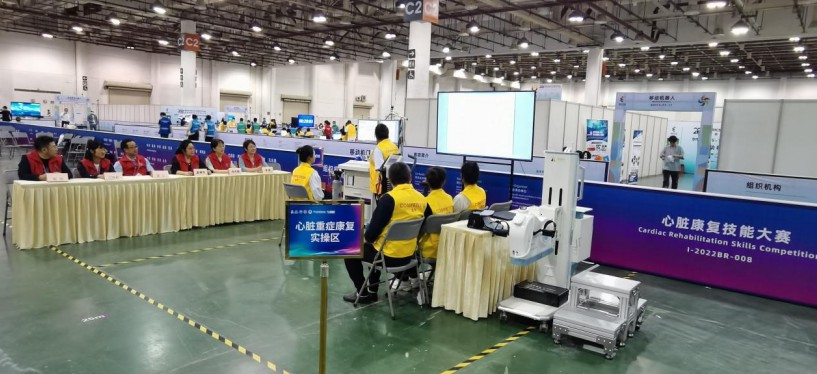
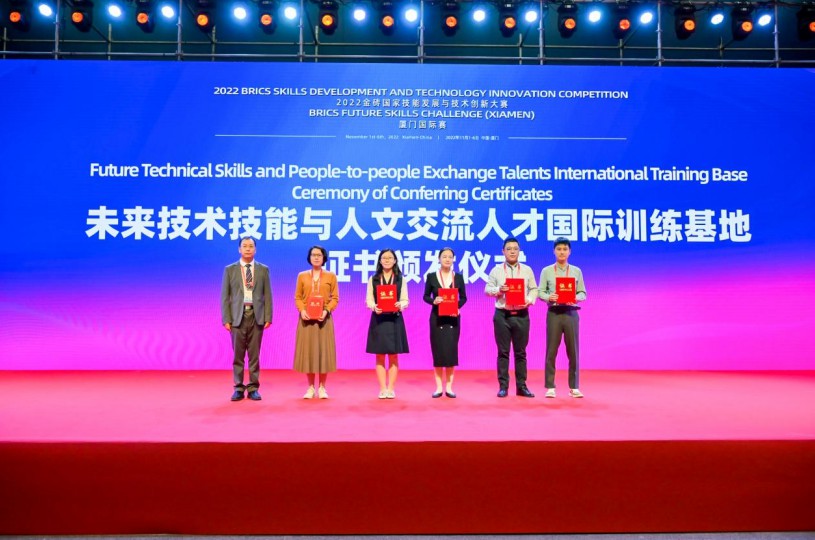
During the closing ceremony, Dr. Liu Zhenying, Chairman of the Board of Directors of the Belt and Road and BRICS International Alliance for Skills Development, presented certificates of "International Training Base for Future Technical Skills and Humanities Exchange Talents" to five programs, including Xiamen City Vocational College, Xiamen Information School, and Xiamen Jimei Vocational and Technical School. In 2020, the Chinese and Foreign Humanities Exchange Center and the Belt and Road and BRICS International Alliance for Skills Development will jointly implement the "BRICS International Training Base Project for Future Technical Skills and Humanities Exchange Talents". Relying on the training base, training camps are organized in the mode of combining online and offline, and joint training is carried out. At the same time, the training bases are used as venues for international remote distributed competitions, organizing remote competitions, conducting localized talent training and promoting local employment. To date, 84 base programs have been established.
2022 BRICS Skills Development and Technological Innovation Competition Xiamen International Competition, as an important project of BRICS New Industrial Revolution Partnership Innovation Base, is an international competition hosted by BRICS Business Council, Xiamen Municipal People's Government, Belt and Road and BRICS International Alliance for Skills Development and BRICS Skills Development Training Center for Skills Development and Technological Innovation of China Association for Science and Technology (CAST), and co-sponsored by China Invention Association, China and Foreign Humanities Exchange Center of Ministry of Education. It is an international competition recognized by the Preparatory Committee for the BRICS Supreme Leaders' Meeting, filed with the Ministry of Foreign Affairs of the People's Republic of China and approved by the BRICS Business Council. After five years of development, the BRICS Competition has become a long-term cooperation mechanism for promoting skills development, joint training of technical and skilled talents and humanistic exchanges among BRICS countries.
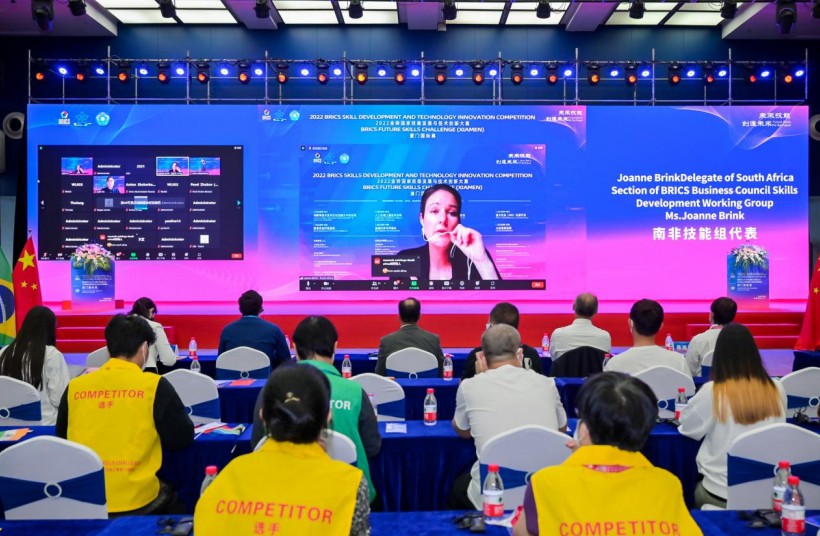
This international competition focuses on intelligent manufacturing technology skills, artificial intelligence, digital technology skills and future technology skills with Industry 4.0 as the core, and is dedicated to cultivating international, high technology and skill level future technology talents and humanities exchange talents by taking the partnership of BRICS countries for new industrial revolution as the main line, and humanities exchanges between China and foreign countries as the link, and cutting-edge technology and skills as the theme, and "Future Skills for Future Creation" as the orientation. It is committed to cultivating internationalized future technical skills talents and humanities exchange talents with high technical skills level.
Since the first BRICS Competition in 2017, five consecutive competitions have been held, with a cumulative total of more than 130,000 participants in the competitions and related conferences, exhibitions, displays, technical exchanges and other activities. The BRICS Competition has kicked off the prelude to the cooperation of BRICS countries in skills competitions and technological innovation, and has become an important platform for promoting educational cooperation, skills development and humanistic exchanges among BRICS countries. Through the combination of competition and training, the integration of competition and education, the promotion of learning through competition and the promotion of reform through competition, the competition has given full play to the importance of promoting skills training among the BRICS countries. Through "combining training and training", "integrating teaching and learning", "promoting learning through competition" and "promoting reform through competition", the Competition has fully played a leading role in promoting skills training, certification, harmonization of standards among BRICS countries, development of future skills curricula and formulation of international group skills standards.
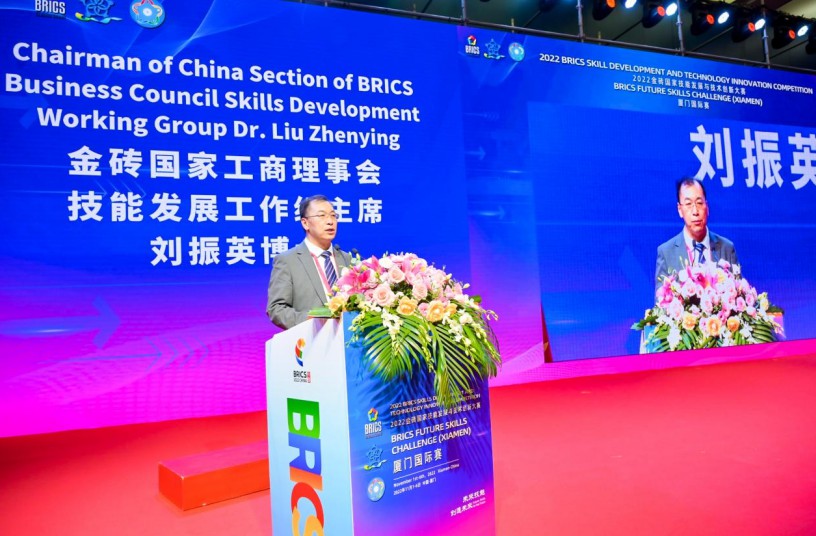
In the last session of the closing ceremony, Liu Zhenying delivered a speech on behalf of the Skills Development Working Group of the BRICS Business Council, the Organizing Committee of the BRICS Skills Development and Technological Innovation Competition, and the Belt and Road and BRICS International Alliance for Skills Development. He said that on January 1 this year, China officially took over the presidency of BRICS, and with the purpose of promoting the opening up of high-level education to the outside world, the BRICS Skills Group will focus on international project cooperation in the following five areas: first, the establishment of the BRICS Skills Standards Development Working Committee under the framework of the Skills Development Working Group to formulate vocational skills standards, develop skills curricula, and issue skills certificates; and second, the cooperation of BRICS Future Secondly, we will cooperate with BRICS future skills training bases to cultivate professional skills talents; thirdly, we will establish a long-term mechanism of BRICS skills development and technological innovation distance lecture hall (virtual or physical classroom) to carry out theoretical and technological seminars as well as skills training; fourthly, we will build the BRICS Institute of Skills Development and Technological Innovation to provide services for the development of skills in BRICS countries; fifthly, we will continue to carry out the BRICS Skills Development and Technological Innovation Competitions including the current one led by the Ministry of Industry and Information Technology, and the BRICS Skills Innovation Competition. Fifthly, we will continue to carry out the BRICS Skills Development and Technology Innovation Competition, including the Xiamen International Competition 2022, led by the Ministry of Industry and Information Technology, which has been incorporated into the important activities of the BRICS Innovation Base for Partnership in the New Industrial Revolution, as well as the BRICS Vocational Skills Competition 2022, and organize the Future Skills Distance Training Camp, so as to improve the mechanism of combining competitions and training.
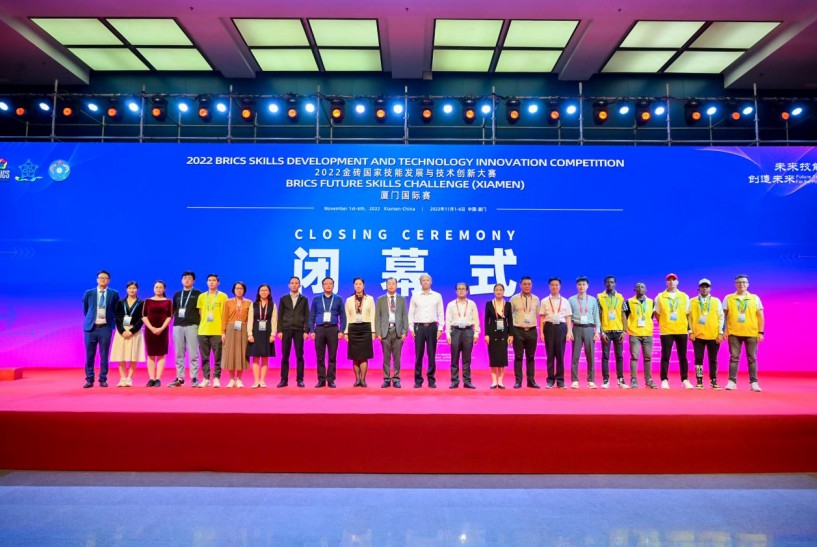
The closing ceremony invited the main leaders of the BRICS Business Council's National Skills Development Working Group, heads of BRICS participating delegations, participating experts and competitors, representatives of educational institutions to participate remotely in an online format, and leaders of local Xiamen vocational colleges and universities, instructors, as well as experts and competitors from the BRICS teams, representatives of the technical support platforms, and friends of the media to attend the event. Nearly 1.2 million people watched the event via live streaming.
Related Reading
推荐文章

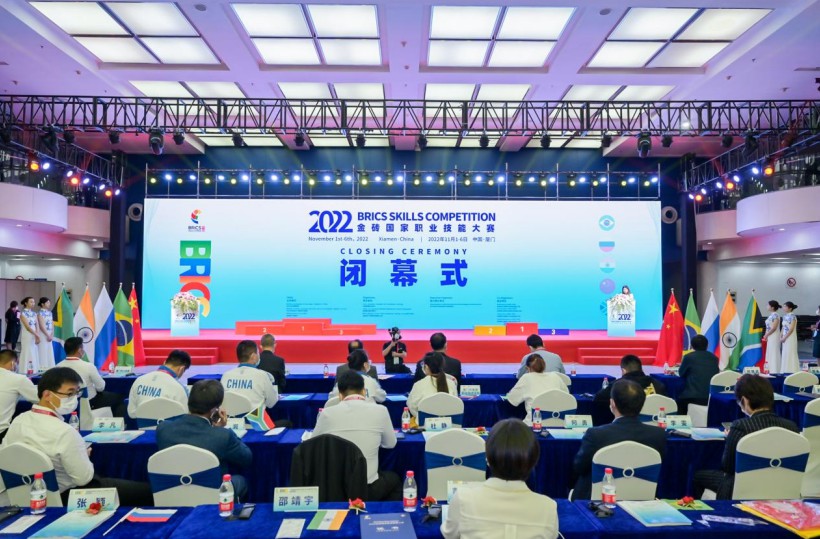
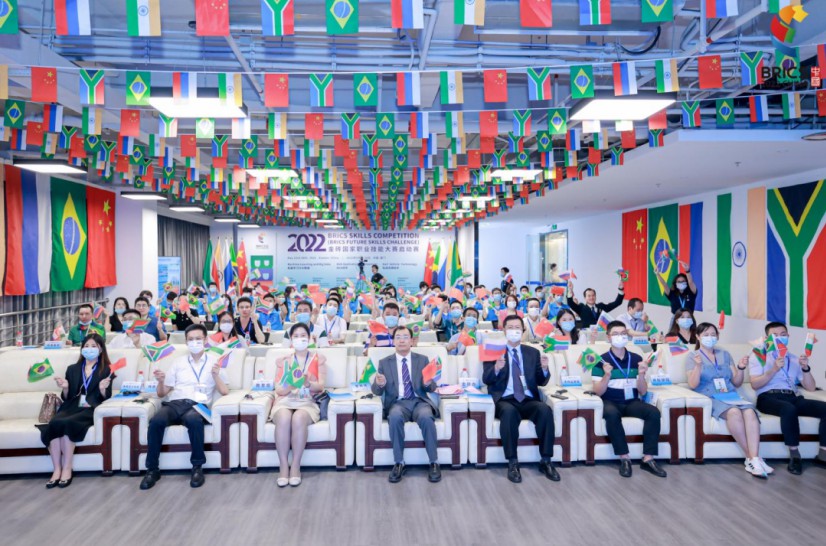
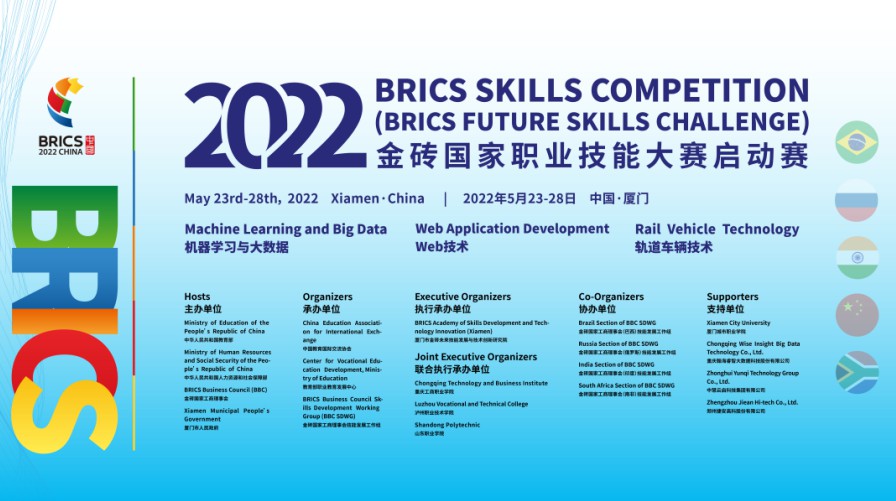
热门文章


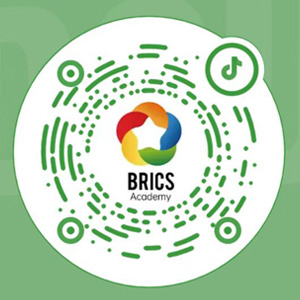
 闽ICP备12331232468号-1
闽ICP备12331232468号-1